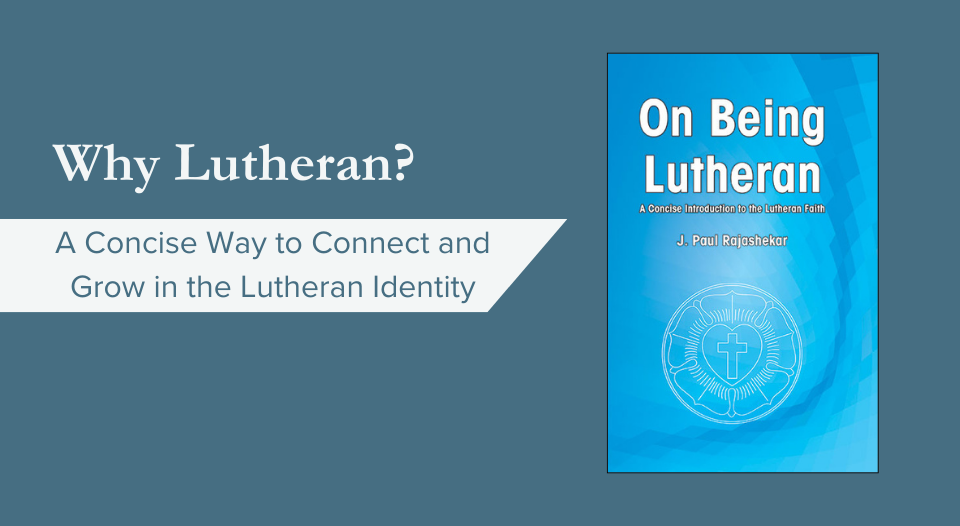For many ELCA congregations, being Lutheran is a core identity, as foundational as being human. But J. Paul Rajashekar, a professor emeritus at United Lutheran Seminary in Philadelphia and director of the Asian Theological Institute, noticed that other ELCA congregations, especially newly established Asian congregations, members and rostered ministers come from non-Lutheran denominations, most of them evangelical.
Rajashekar recognized that many candidates for ministry from these congregations studied through the Theological Education for Emerging Ministries (TEEM) program, an ELCA leadership formation process designed for people already serving in new worship communities. He noticed that without a foundational understanding of Lutheranism, they are missing a large component of answering the question, “Why Lutheran?” That is why he wrote On Being Lutheran, which was jointly published by the ELCA and Christian World Imprints.
“I thought [this was] something I could do in a very simplified, elementary way, a concise way that they could sit and read without reading big manuals and books on Lutheran tradition,” Rajashekar said. The book is short and concise, written in the question-and-answer style of Martin Luther’s Small Catechism. It explores four parts of Lutheran identity—theology, history, worship and governance—and explains how to become a Lutheran.
Rajashekar spent six months writing On Being Lutheran with guidance and feedback from seminary colleagues, pastors in the Philadelphia area, and the ELCA’s department of Theological Discernment. The next step was to find a publisher. Some in the churchwide organization wanted to publish the content online, but Rajashekar had concerns.
“Anything on the web is not really helpful for our pastors who seldom go to the web,” he said. “So then we decided to get it printed, and it’s cheaper to print it in India and then bring it here.”
“Lutheranism is a worldwide movement, not simply American and the German movement. I want [people] to look at Lutheranism from a global perspective rather than a purely national perspective in the United States.”
The first edition of On Being Lutheran, published in India for Indian churches, covered the history of Lutheran congregations, and how prevalent Lutheranism has been on the subcontinent, establishing one of the earliest churches outside of Europe in the early 1700s. The next edition, which Rajashekar calls the “green one” for its cover, included the history of the ELCA and its predecessor churches but also a broader understanding of Lutheranism.
“Lutheranism is a worldwide movement, not simply American and the German movement,” Rajashekar said. “I want [people] to look at Lutheranism from a global perspective rather than a purely national perspective in the United States.”
Though he intended the book to help Asian rostered ministers in U.S. Lutheran congregations, Rajashekar wrote it in language that anyone can grasp, concisely yet fully explaining the basic tenets of the faith, how the ELCA functions and how Lutherans stand out from other Christian denominations. He said the book has not caught on in the United States but that those who have read it have been using it in their congregations and inviting him to speak.
Rajashekar’s passion for helping Asian Lutheran congregations and Asian Lutherans in the United States has not slowed. In mid-January, he spent a week with other Lutherans from the United States, Canada, Australia and various Asian nations at the biannual Asian Lutheran International Conference in Kota Kinabalu, Malaysia. Focused on the theme “Lift Every Voice,” the conference gave attendees a chance to network and learn how they could lift each other up. Rajashekar joined dozens of ELCA members and leaders; the ELCA delegation was led by Khader El-Yateem, executive director of the ELCA Service and Justice home area, and Teresita Valeriano, program director for ECLA Asian and Pacific Islander ministries.
“[This conference helps] Asian congregations in the U.S. have connections to their home churches in Asia,” Rajashekar said. “So this networking is one way of strengthening the ministries of the Asian congregations in the U.S. with the assistance of Asian Lutheran churches in Asia.”
Another goal for the conference is to develop theological resources for Asian Lutheran churches and Asian ministries. There is a vital need to connect Asian congregations in the United States and in Asia, and that can be done through literature, Rajashekar said.
“We did the book on Luther’s Small Catechism, commentary on his catechism from an Asian perspective, and it has been well received,” he said. “So this conference gives us an opportunity to think of new resources.” He says his next book may be related to the Augsburg Confession, the primary confession of faith for Lutherans worldwide; its 500th anniversary will be celebrated in 2030.
Visit the Association of Asian and Pacific Islanders’ publications page for information about ordering this book and other resources.





